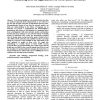Free Online Productivity Tools
i2Speak
i2Symbol
i2OCR
iTex2Img
iWeb2Print
iWeb2Shot
i2Type
iPdf2Split
iPdf2Merge
i2Bopomofo
i2Arabic
i2Style
i2Image
i2PDF
iLatex2Rtf
Sci2ools
152
click to vote
SOCIALCOM
2010
2010
A Methodology for Integrating Network Theory and Topic Modeling and its Application to Innovation Diffusion
Text data pertaining to socio-technical networks often are analyzed separately from relational data, or are reduced to the fact and strength of the flow of information between nodes. Disregarding the content of text data for network analysis can limit our understanding of the effects of language use in networks. We present a computational and interdisciplinary methodology that addresses this limitation by combining theory from socio-linguistics with social network analysis and machine learning based text mining: we use network analysis to identify groups of individuals who assume the theoretically grounded roles of change agents and preservation agents. People in these roles differ in their motivation and capability to induce and adopt change in a network. Topic modeling is then constrained to the texts authored by people in these roles. We apply this methodology to a public dataset of about 55,000 research proposals that were granted funding. Our results suggest that the people per ro...
Related Content
| Added | 15 Feb 2011 |
| Updated | 15 Feb 2011 |
| Type | Journal |
| Year | 2010 |
| Where | SOCIALCOM |
| Authors | Jana Diesner, Kathleen M. Carley |
Comments (0)

